See also
| This disambiguation page lists articles associated with the title Songs of Innocence and of Experience. If an internal link led you here, you may wish to change the link to point directly to the intended article. |
Songs of Innocence and of Experience is an illustrated collection of poems by William Blake in two volumes.
Songs of Innocence and of Experience and variants may also refer to:
| This disambiguation page lists articles associated with the title Songs of Innocence and of Experience. If an internal link led you here, you may wish to change the link to point directly to the intended article. |
William Elden Bolcom is an American composer and pianist. He has received the Pulitzer Prize, the National Medal of Arts, a Grammy Award, the Detroit Music Award and was named 2007 Composer of the Year by Musical America. Bolcom taught composition at the University of Michigan from 1973–2008. He is married to mezzo-soprano Joan Morris.
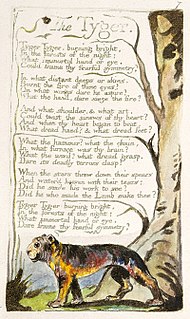
"The Tyger" is a poem by the English poet William Blake published in 1794 as part of the Songs of Experience collection. Literary critic Alfred Kazin calls it "the most famous of his poems", and The Cambridge Companion to William Blake says it is "the most anthologized poem in English". It is one of Blake's most reinterpreted and arranged works.
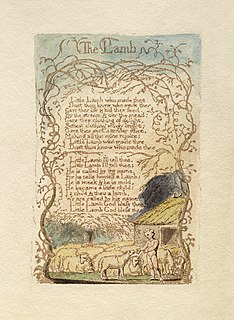
"The Lamb" is a poem by William Blake, published in Songs of Innocence in 1789.
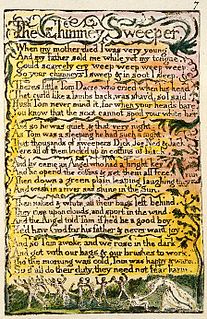
"The Chimney Sweeper" is the title of a poem by William Blake, published in two parts in Songs of Innocence in 1789 and Songs of experience in 1793. The poem "The Chimney Sweeper" is set against the dark background of child labour that was prominent in England in the late 18th and 19th century. At the age of four and five, boys were sold to clean chimneys, due to their small size. These children were oppressed and had a diminutive existence that was socially accepted at the time. Children in this field of work were often unfed and poorly clothed. In most cases, these children died from either falling through the chimneys or from lung damage and other horrible diseases from breathing in the soot. In the earlier poem, a young chimney sweeper recounts a dream by one of his fellows, in which an angel rescues the boys from coffins and takes them to a sunny meadow; in the later poem, an apparently adult speaker encounters a child chimney sweeper abandoned in the snow while his parents are at church or possibly even suffered death where church is referring to being with God.

Songs of Innocence and of Experience is an illustrated collection of poems by William Blake. It appeared in two phases. A few first copies were printed and illuminated by William Blake himself in 1789; five years later he bound these poems with a set of new poems in a volume titled Songs of Innocence and of Experience Shewing the Two Contrary States of the Human Soul. William Blake was also a painter before the songs of innocence and experience and made paintings such as Oberon, Titania, and Puck dancing with fairies.
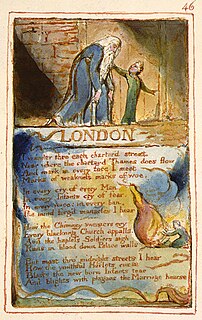
London is a poem by William Blake, published in Songs of Experience in 1794. It is one of the few poems in Songs of Experience that does not have a corresponding poem in Songs of Innocence. Blake lived in London so writes of it as a resident rather than a visitor. The poems reference the "Two Contrary States of the Human Soul". The "Songs of Innocence" section contains poems which reference love, childhood and nature. Critics have suggested that the poems illustrate the effects of modernity on people and nature, through the discussion of dangerous industrial conditions, child labour, prostitution and poverty.

"The Little Black Boy" is a poem by William Blake included in Songs of Innocence in 1789. It was published during a time when slavery was still legal and the campaign for the abolition of slavery was still young.

"The Blossom" is a poem by William Blake, published in Songs of Innocence in 1789.

Holy Thursday is a poem by William Blake, from his 1789 book of poems Songs of Innocence.

William Blake's body of work has influenced countless writers, poets and painters, and his legacy is often apparent in modern popular culture. His artistic endeavours, which included songwriting in addition to writing, etching and painting, often espoused a sexual and imaginative freedom that has made him a uniquely influential figure, especially since the 1960s. After Shakespeare, far more than any other canonical writer, his songs have been set and adapted by popular musicians including U2, Jah Wobble, Tangerine Dream, Bruce Dickinson and Ulver. Folk musicians, such as M. Ward, have adapted or incorporated portions of his work in their music, and figures such as Bob Dylan, Alasdair Gray and Allen Ginsberg have been influenced by him. The genre of the graphic novel traces its origins to Blake's etched songs and Prophetic Books, as does the genre of fantasy art.
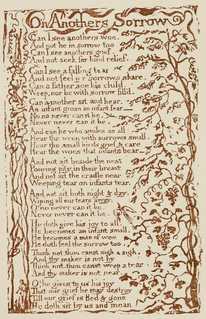
On Another's Sorrow is a poem by the English poet William Blake. The poem discusses human and divine empathy and compassion. It was published as part of the Songs of Innocence and of Experience in 1789 as the last song in the Songs of Innocence section.

Songs of Experience is the second studio album by American composer and producer David Axelrod. It was released in October 1969 by Capitol Records. Axelrod composed, arranged, and produced the album while recording with session musicians such as guitarist Al Casey, drummer Earl Palmer, and conductor Don Randi.

The Voice of the Ancient Bard is a poem written by the English poet William Blake. It was published as part of his collection Songs of Innocence in 1789, but later moved to Songs of Experience, the second part of the larger collection Songs of Innocence and of Experience, 1794.
"Night" is a poem in the illuminated 1789 collection Songs of Innocence by William Blake, later incorporated into the larger compilation Songs of Innocence and of Experience. "Night" speaks about the coming of evil when darkness arrives, as angels protect and keep the sheep from the impending dangers.

"The Little Boy Found" is a poem by William Blake first published in the collection Songs of Innocence in 1789. Songs of Innocence was printed using illuminated printing, a style Blake created. By integrating the images with the poems the reader was better able to understand the meaning behind each of Blake's poems.

"The Little Boy Lost" is a simple lyric poem written by William Blake. This poem is part of a larger work entitled Songs of Innocence which was published in the year 1789. "The Little Boy Lost" is a prelude to "The Little Boy Found".
Songs of Experience is an illustrated collection of poems by William Blake, second book of two in Songs of Innocence and Experience.
Songs of Innocence is an illustrated collection of poems by William Blake, the first book of two in Songs of Innocence and Experience.
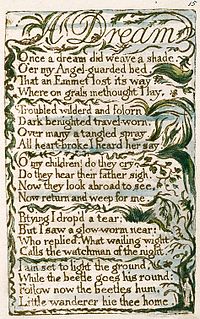
"A Dream" is a poem by English poet William Blake. The poem was first published in 1789 as part of Blake's collection of poems entitled Songs of Innocence.

Songs of Innocence and Experience is an album by American beat poet and writer Allen Ginsberg, recorded in 1969. For the recording, Ginsberg sang pieces from 18th-century English poet William Blake's illustrated poetry collection of the same name and set them to a folk-based instrumental idiom, featuring simple melodies and accompaniment performed with a host of jazz musicians. Among the album's contributors were trumpeter Don Cherry, arranger/pianist Bob Dorough, multi-instrumentalist Jon Sholle, drummer Elvin Jones, and Peter Orlovsky — Ginsberg's life-partner and fellow poet — who contributed vocals and helped produce the recording with British underground writer Barry Miles.